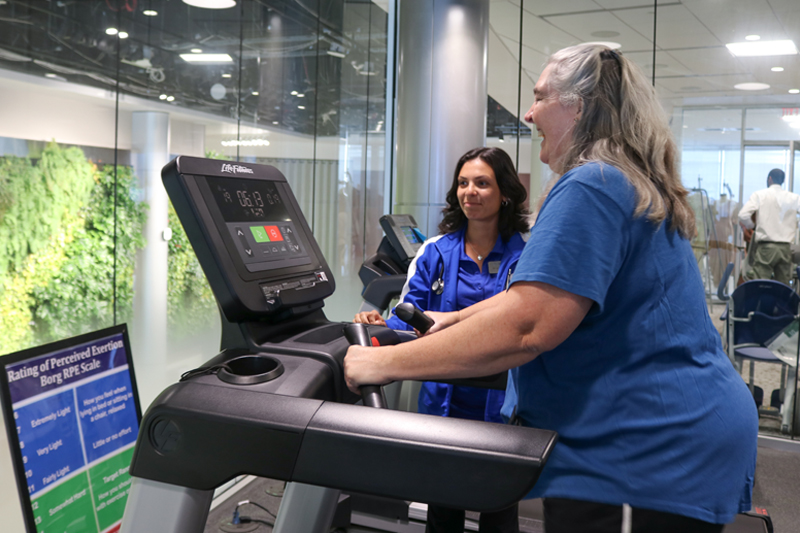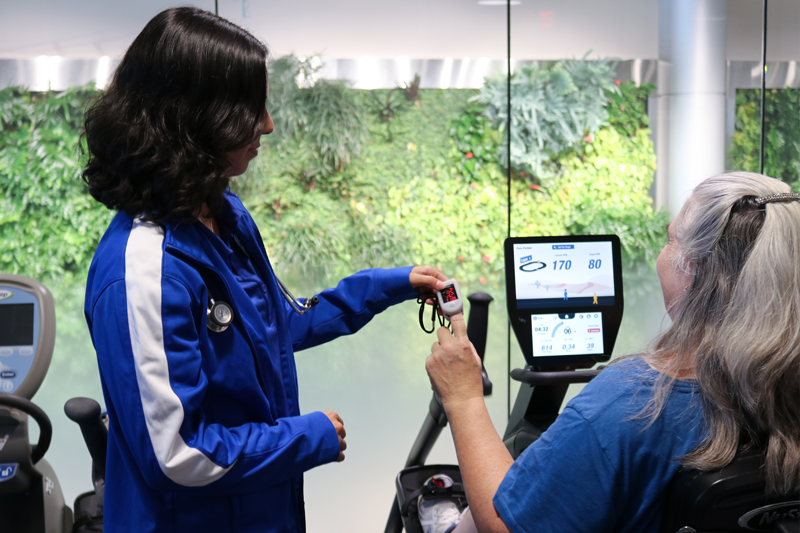


Personal training meets chronic care
Photos by Kristen Troy February 02, 2024
UD’s one-of-a-kind medical fitness and rehabilitation program seeks to grow
When Michelle Babiarz walks into the Exercise and Functional Training Lab on the second floor of the University of Delaware’s STAR Tower, she’s greeted with all smiles. The encouraging, positive environment drives her to attend workouts three times a week.
“I feel like I made a commitment to the program to get on the right track, and it’s been a very positive experience,” she said.
Before her workout begins, a clinical exercise physiologist takes her blood pressure and checks her heart rate. Then she hops on the NuStep recumbent cross trainer and begins her high-intensity interval training.
“Go, go, go, Michelle!” shouted exercise physiology graduate student Robin Collura.
The consistent motivation throughout the workout fuels Babiarz to push harder.
“I want to get to 260 steps per minute,” Babiarz said.
Before she knows it, her workout is over.
“The time just flies,” Babiarz said.
Babiarz was diagnosed with multiple sclerosis four years ago and found working out in a gym on her own daunting. She was referred to UD’s one-of-a-kind medical fitness and rehabilitation program, where she received an individualized treatment plan and the motivation that she needed to stick with it.

“This program has made a huge difference in reteaching my muscles how to work, but the positivity and the camaraderie keep me coming back,” Babiarz said.
Research from UD’s College of Health Sciences identified a clear need in the community for rehabilitative programs — beyond physical therapy — for people with chronic health conditions. Brittany Overstreet, assistant professor of kinesiology and applied physiology, was the impetus behind the creation of the now-flourishing community outreach program that also gives master’s students in the exercise physiology program hands-on clinical experience.
“There are very few programs like this across the entire country,” Overstreet said. “After cardiac or pulmonary rehab, most people stop exercising or join a gym and try to exercise on their own, but usually that’s short-lived. Additionally, only a few health conditions are currently covered by insurance for this type of service. We aim to serve the larger community with more diverse needs.”
Patients with qualifying chronic health conditions can attend UD’s medical rehabilitation and fitness program with a designated number of free sessions. Then, they can opt in and pay for services just like they would a monthly gym membership. Overstreet’s ultimate goal is to expand the cutting-edge program that serves as a model to advance the clinical exercise physiology field and secure medical reimbursement for patients. With the capacity to see more than 100 patients a week, the program has a waitlist a mile long.
“We’ve proven the demand is there, and we can fill the void,” Overstreet said. “These individuals need adaptive equipment and have special safety considerations that require monitoring and individualized exercise plans. Clinical exercise physiologists are uniquely trained to work with individuals with chronic health conditions; it’s rare to find a program like this run exclusively by these professionals.”
Contact Us
Have a UDaily story idea?
Contact us at ocm@udel.edu
Members of the press
Contact us at 302-831-NEWS or visit the Media Relations website

